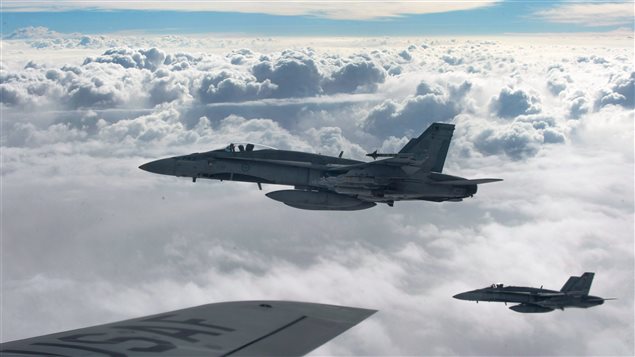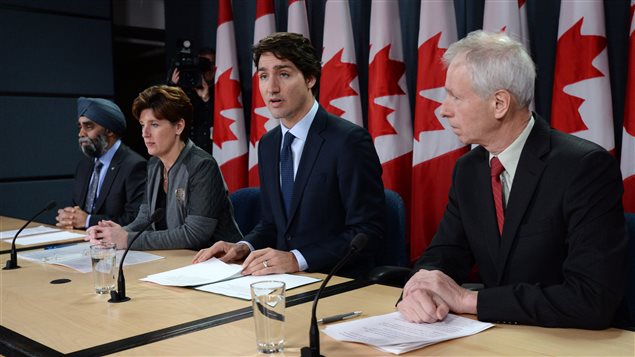Canada will stop its participation in coalition airstrikes against the Islamic State in Iraq and Syria (ISIS) no later than Feb. 22, while it triples the number of special forces deployed to train Iraqi Kurdish forces on the ground for the next two years, Prime Minister Justin Trudeau announced Monday.
“It is important to understand that while airstrike operations can be very useful to achieve short-term military and territorial gains, they do not on their own achieve long-term stability for local communities,” Trudeau told reporters in Ottawa.
“Canadians learned this lesson first-hand during a very difficult decade in Afghanistan, where our Forces became expert military trainers renowned around the world.”
While Canada will pull its six CF-18 Hornet fighter jets from the bombing mission, it will keep its aircrew and support personnel for one CC-150 Polaris aerial refuelling aircraft and up to two CP-140 Aurora aerial surveillance aircraft, said Trudeau.
The number of elite Canadian commandos helping train Kurdish peshmerga fighters in northern Iraq will jump from 69 to 230, bringing the total of Canadian soldiers deployed in the region to about 830.
“We will be supporting and empowering local forces to take their fight directly to ISIL so that kilometre by kilometre they can reclaim their homes, their land and their future,” Trudeau said, using an alternate name to refer to ISIS.
‘Comprehensive approach’
Flanked by Foreign Affairs Minister Stéphane Dion, National Defence Minister Harjit Sajjan and the Minister of International Development Marie-Claude Bibeau, Trudeau said the government is taking a comprehensive approach to the crisis in Iraq and Syria.
Canada will provide $840 million in humanitarian assistance over three years, said Trudeau.
Ottawa has also allocated $270 million over three years to “build local capacity” in Jordan and Lebanon that are hosting over two million Syrian refugees.
Canada also plans to beef up its diplomatic presence in Lebanon, Jordan and Iraq to play a more prominent role in finding a diplomatic solution to the crisis, said Trudeau.
Trudeau committed to staying in Iraq for at least two years, and promised to put the new policy to a debate in Parliament when the House of Commons resumes next week and a subsequent vote.
“ISIL would like us to see them as a credible threat to our way of life and to our civilization,” Trudeau said, calling for a level-headed debate in Parliament. “We know Canada is stronger, much stronger than the threat posed by a murderous gang of thugs who are terrorising some of the most vulnerable people on Earth.”
‘A step backwards for Canada’

Rona Ambrose, Leader of the Official Opposition and Interim Leader of the Conservative Party, denounced the Liberal plan to withdraw the fighter jets as “a step backwards for Canada.”
The Liberals have failed to explain to Canadians why they believe it is a good idea to step back from the bombing mission in Iraq and Syria, Ambrose said.
“Today’s announcements on training and humanitarian assistance are only designed to distract Canadians from the withdrawal of our CF-18s,” she said. “The only reason for this decision that anyone can point to is that it was done for political purposes in the heat of an election campaign. Canadians certainly deserve better.”
Instead of playing a military combat role Canada should focus on stopping the flow of arms, funds and foreign fighters, including improving anti-radicalization efforts at home, NDP Foreign Affairs Critic Hélène Laverdière said in a statement.
“We are concerned that the Liberal government has chosen to place Canadian Forces personnel deeper into an open-ended combat military mission in Iraq – a mission that fails to even define what success would look like,” Laverdière said. “The Trudeau Liberals promised to end the Conservative government’s mission and said we need a clearer line between combat and non-combat. Today’s announcement actually blurs these lines even more.”
Trudeau said he has discussed his plan in conversations with other coalition leaders, including U.S. President Barak Obama, German Chancellor Angela Merkel, British Prime Minister David Cameron, French President Francois Hollande and Iraq Prime Minister Haider Al-Abadi, who thanked him for Canada’s new role.
The prime minister’s announcement comes as Sajjan prepares to leave for Brussels, where he will meet with NATO defence ministers on Feb. 10-11.
The previous Conservative government committed Canada to the coalition airstrikes until March, but the new Liberal government was elected on a pledge to pull Canada’s six CF-18 fighter jets out of the bombing mission.
A more dangerous mission
Speaking at a technical briefing following Trudeau’s press conference, Canada’s top soldier, Chief of Defence Staff Gen. Jonathan Vance, admitted that the military’s new mission to assist, advise and equip Kurdish forces increases the risks for Canadian special forces stationed in Iraq.
“We will be involved in engagements as we defend ourselves or those partners who we are working with,” Gen. Vance said, insisting that in his view it was still a non-combat mission. “We are not the principal combatants, we’re supporting those who are; we will be in proximity to the danger they are in proximity; we will be in a region that is contested and we will potentially suffer the challenges that such a region offers.”
In addition to training the Kurdish forces, Canada will also be arming them with light weapons such as assault rifles, machine guns and light mortars, as well as optical systems for these weapons and ammunition, Gen. Vance said.







For reasons beyond our control, and for an undetermined period of time, our comment section is now closed. However, our social networks remain open to your contributions.